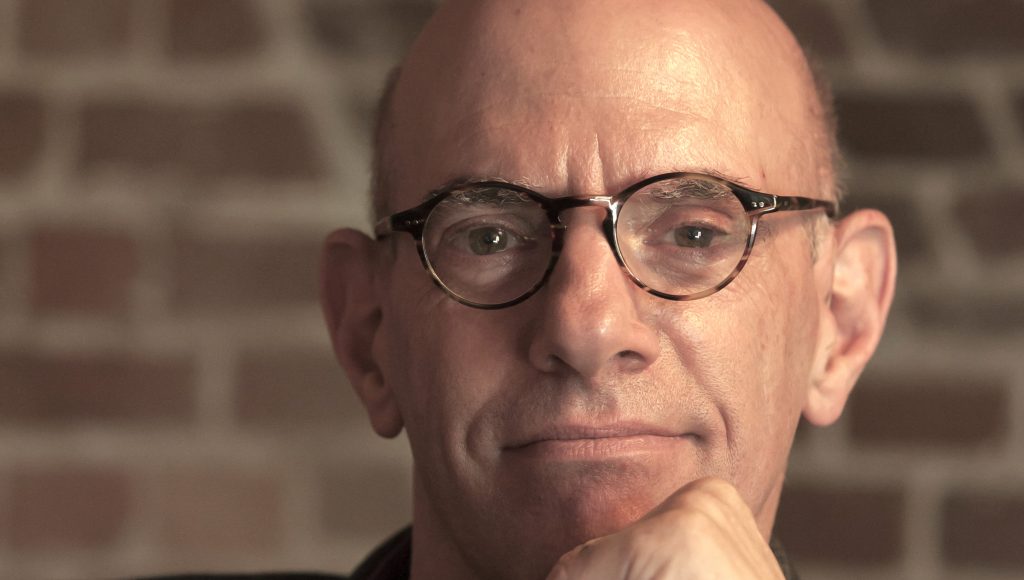Mark Nepo: Drinking from the River of Light
(Global Heart | Esther Haasnoot) Collaborate with the Universe “in adding to the joy of existence.” Mark Nepo’s latest book ‘Drinking from the River of Light’ is a beautiful invitation and encouragement to deepen and express the gift of our authentic voice.
Drinking from the river of light: the life of expression
In conversation with Mark Nepo about his new book “Drinking from the River of Light”.
Global Heart: The book is titled “Drinking from the River of Light.” What does this mean to you?
Mark Nepo: Recently, while in London, I stood before one of Blake’s illustrations. It was a sketch of Dante on his knees, drinking from the River of Light, which descended from somewhere unseen like a waterfall. In this sketch, drawn three years before his death, Blake brought into being a portrait of himself. As I stood before it, over two hundred years later, I knew in my heart it was a portrait of me as well, and of every writer and teacher who ever lived. For when we express, when we let out what is in, regardless of how we are drinking from the River of Light. And that act, that devotion, allows us to glimpse the fabric of the Universe and the web of connection that holds life together. Glimpsing this, we are forever enlivened.
When I write, I’m only trying to reach the River of Light that informs all life and to drink from it, so I can be a conduit for life-force in the world. When I teach, I’m only trying to bring those who are willing to the River of Light, where we can drink and look at each other through awakened eyes. For I firmly believe that all forms of expression and education are meant to awaken the love that is possible in the world. And so, you don’t have to work to find what is lasting and enlightened. You simply have to open your heart and let what’s there flow. The rest will follow. Expression will find you. For water finds water, light finds light, feelings find meaning, and love finds love.
Global Heart: You often talk about poetry and art as an inner process that is available to all. In your opinion, what is the purpose of creativity?
Mark Nepo: Ever since my cancer experience in my mid-thirties, I have moved from trying to produce beautiful art to being devoted to the healing journey of expression. Just as no one can live without inhaling and exhaling, no one can live without feeling and expressing. The life of expression and creativity is how the heart breathes and how our spirit grows in the life that carries it. Writing, whatever form it takes—poetry, story, memoir, or reflection—is a personal form of expression, a necessary conversation with the Universe. As meditation is an ancient art that deepens our relationship to how we breathe, writing is an ancient art that deepens our relationship to all that matters. And just as the reward for practicing meditation is not that we’ll become great breathers but that we’ll become clear vessels of life-force, the reward for practicing a personal form of expression is not that we’ll become great writers but that such practice will help us wake closer to life.
Global Heart: You speak about knowing ourselves, our creative force, and our own nature, as intimately as possible, so we can make the choices that are most integral with our own true nature. Do you see art as an expression of our soul?
Mark Nepo: Yes, for what is not ex-pressed is de-pressed. The fundamental truth of being human is that we are incredibly sensitive creatures whose joy and pain are registered through that unique sensitivity. No matter the form it takes, this sensitivity allows us the gift of seeing and perceiving. This sensitivity allows us to make sense of being alive. Unlike any other form of life, being human allows us to fit things together or to break things apart. Inhabiting the art of expressing ourselves is what lets us fit things together rather than break things apart. The art of expressing ourselves—what we experience, what we feel, what we think, and what we imagine exists within us and beyond us—is a form of inner breathing. And so, we each must learn how to do this or we will cease to exist. If you stop breathing, you will die. If you stop expressing, you may still walk around and buy groceries and pay the bills, but you will not be alive. This lifelong process of taking in and letting out is the necessary art by which we lift the veils between us and keep the world together.
Global Heart: Given this, how do we understand and find our own unique voice?
Mark Nepo: The reward for working hard and long at being thoroughly human is that you begin to discover and inhabit the instrument that is you. And the gift for being an instrument is threefold: we are at last of use, we help repair the world, and we are played like a reed by the wind. Against all odds, being an instrument lets us carry truth and give away tenderness. When so deeply engaged, we become finely tuned beings. And despite our wildest ambitions, there can be no greater destiny than to convey the larger Universe through the truth of who we are.
Given this, how do we understand voice? Great jazz musicians each have a singular voice, uniquely theirs, and they each convey the eternal chord of all music. Likewise, a person’s voice is their singular quality of expression through which the eternal chord of all life is conveyed. In the same way, a writer’s voice is at once singular and universal, encompassing much more than style. For voice resides at the place inside where the personal expresses the Universal.
A writer can’t create voice, only make space for it by being authentic and tend to it when it comes through. Walt Whitman’s voice was that of a hawk gliding endlessly over a growing city. Rainer Maria Rilke’s voice was that of a shaman draping a sacred hood over everything ordinary so he could watch it glow. And Emily Dickinson’s voice was that of a small bird perched on a window ledge between the body and the soul.
Consider the banks of a river. The banks don’t own the river. They carry it. The more thoroughly the banks hold the river, the deeper the river flows. The deeper the river flows, the more hollowed the banks become. Until the river runs faster and deeper, carrying the silt of the river bottom with it. Like the banks of a river, we are hollowed out by life to carry the deeper current to a greater sea. In just this way, the instrument that is you is beautifully hollowed by the deep waters that you carry. And while no one owns what flows through them, that phenomenal depth carries the silt of who you are with it. In time, we become like the banks of an old, swift river and add to the flow of life without ever owning it. The sound of all-that-is flowing through us is the sound of our voice.
Global Heart: You speak about art, and all of what art expresses, as already fully formed somewhere in the very fabric of things—just waiting for us to discover it and express it. Can you tell us more about this?
Mark Nepo: In 1994, I was in Montreal wandering through the Botanical Gardens with my dear friend Robert when we happened into an enormous greenhouse of cacti from around the world. These exotic and substantial treelike plants were five to twelve feet high. It could have been an outdoor museum of abstract sculptures. Immediately, I realized that everything we create already exists somewhere in nature as an elemental form.
A few years later, I ran across a recording of hundreds of crickets in a field at night. Magically, when the recording is slowed down, all those crickets rubbing their forewings together sound like a choir in glorious chant. This is more evidence that when we create what we think is new, we recreate fundamental forms that already exist in nature, which have been there since the beginning of time.
With this in mind, we’ve been miseducated to aspire to do what has never been done. When Ezra Pound said in 1928, “Make it new!” he sparked an entire generation to be as different and avant-garde as possible. But such forced uniqueness has nothing to do with inhabiting the common sense of Origin we all are born with.
It is through our efforts to connect with what is Original, rather than trying to be original, that we resurrect and extend what has always been. For original means a return to the Origins. Beyond all craft and technique, this is at the heart of creativity, the enlivening of our deepest nature through our return to the Origins that we all share. It turns out that our yearning to create is less about inventing something new as it is about inhabiting a timeless form, which might be new to us, through which we can feel the presence of all life in all time.
Global Heart: Do you experience art as a conversation with a creative force?
Mark Nepo: Yes. This inquiry into the life of expression is not just about writing but the unnamable process under all art forms—the process of perceiving and feeling our way into life. And more than whatever we might create, the value of inhabiting this timeless process resides in how it helps us come alive by staying in conversation with life. So, while the examples and stories from different fields of creativity help to reveal this process, this book is not just for writers and artists but for anyone intent on staying close to the pulse of life.
As one form of expression, writing, whatever form it takes—poetry, story, memoir, or reflection—is a personal and necessary conversation with the Universe. And while there are many outstanding books that focus on craft and language, this book focuses on the irrepressible aspects of expression, how the forces of life enter us and leave us, and what they do to us on their way through. The exercises throughout are intended to introduce you to the skills of vision, perception, feeling, and articulation, which are the veins and arteries by which Spirit moves between us and the world. Whether we consider ourselves artists or not, we perceive and express as a way to extract what is essential to living.
About Mark Nepo
Mark Nepo is a poet and philosopher who has taught in the fields of poetry and spirituality for over 40 years. A #1 New York Times bestselling author, he has published 21 books and recorded 14 audio projects His work has been translated into 20 languages. Mark has been interviewed several times by Oprah Winfrey on her Super Soul Sunday TV program and was interviewed by Robin Roberts for Good Morning America. Recent work includes More Together Than Alone (Atria, 2018) cited by Spirituality & Practice as one of the Best Spiritual Books of 2018; Things That Join the Sea and the Sky (Sounds True, 2017), a Nautilus Book Award Winner; and The Way Under the Way: The Place of True Meeting (Sounds True, 2016), also a Nautilus Book Award Winner. Visit MarkNepo.com or ThreeIntentions.com for more information
You may also like:
Questions for Eckhart: finding balance
How to know when you’re on the right path (Oprah and Caroline Myss)




